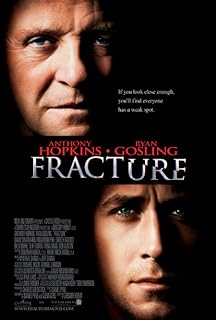電影訊息
電影評論更多影評

2011-06-25 19:04:43
《破綻》,匠氣有餘,靈氣不足
諸種類型的電影裡,只有科幻片和律政片是無論好壞長短我都能津津有味地看下去的,如此,Gregory Hoblit的片兒肯定不會少看,此君實乃律政專業戶,哪怕是哈特的戰爭這樣似乎是戰爭片的,黑洞頻率這樣似乎是科幻片的,拍著拍著,一看。。哎?他又兜回律政戲去了。。
要說是因為老先生獨愛律政題材?我看未必,恐怕更多是因為他只擅長律政戲的場面調度和敘事手法,只敢於在熟悉的套路上做些微調。一言以蔽之,匠氣。
還是那句重複了很多遍的話:工匠與大師的區別,就在於大師每次都不惜代價地冒險嘗試,努力超越,不斷破繭重生,工匠卻只知因熟生巧,循規蹈矩,不斷重複自己。
《破綻》也是這樣,又一部匠氣有餘,靈氣不足的片子。
安東尼霍普金斯的演技固然是沒話說的,可須知電影藝術的靈魂向來在導演和編劇,一部需要靠演員撐場面的電影離爛片不會太遠,不僅如此,好導演的能力之一就在於給予好演員足夠的表現空間,如果你能力不夠駕馭卻想借好演員取巧,只會弄巧成拙。
本片仰賴安東尼霍普金斯一貫高智商超變態殺人犯的演繹,結果卻導致嚴重的問題——對手戲的Ryan Gosling在演技和台詞上都根本無法與之抗衡。Ryan Gosling我不太熟悉,風聞其竟曾被稱為梅爾吉布森接班人,真叫人哭笑不得。在本片中其在霍普金斯的壓迫下實在乏善可陳,在表現正義感的時候表現得像個二愣子,在表現機智的時候顯得輕佻浮誇,在其餘的時候則一概顯得無能或可憐,這他倒在行,簡直讓我懷疑是他的本色演出了。偏偏在敘事結構上,這個檢察官是中樞人物,實際拍攝中鏡頭更是圍著年青後生七百二十度地轉,特寫不厭其煩,愣是沒有一個抓人的鏡頭。如此一來,整個影片的失衡在所難免。特別是影片行到中段,壞老頭兒的謀劃已全部展露,該秀的戲都秀完了,大包袱又還沒到抖的時候,鏡頭只能圍著檢察官轉,此時劇情張力全無,節奏頓顯拖沓無比。(順便一提,反倒是演DA的David Strathairn很像樣,不愧老戲骨。)
其實也不能太苛求演員,拿一個電視劇級別的懸念拾掇拾掇就想湊一部電影賣的編導才是根子,對Gregory Hoblit來說,其劇情薄弱立意不高是一貫的問題,從《一級恐懼》起就存在(理查基爾和愛德華諾頓的超絕演技彌補了不少),既然是拍律政的,那麼法律背後的價值理念,智慧靈性就應該是影片的最終落腳點,僅僅一味獵奇,僅僅流於技術層面,僅僅有質疑和解構是支撐不起一部好電影的。
《一級恐懼》和《破綻》的問題恰恰就在這裡,一個是超變態高智商青年殺人犯,一個是超變態高智商老年殺人犯,都是鑽了法律的空子操縱了司法體系,然後呢?沒了。除了抖包袱拍案驚奇外再無闡發,你說這故事精彩吧,在細節上又做不到嚴絲合縫,結果兩邊不靠譜,雖然配樂攝影精良,但這只能代表好萊塢電影生產流水線的品質,對影片本身品質的提升無濟於事。如此種種,使得影片回味甚至不如boston legal的一些劇集。
牢騷發完,無論如何,律政片兒咱永遠不嫌多,哪怕不是那麼好,畢竟不能要求部部都是《十二怒漢》。。有得看就該高興啦。。
Gregory Hoblit大叔,fighting!您那選劇本也挑挑,自己編劇不行就別逞強了,去拍John Grisham的小說去吧。。
=====================
看到論壇和評論裡許多人爭論結尾,這裡補充一個關於Double Jeopardy的影片細節:
"Near the end, the case Beachum reviews regarding double jeopardy is People v. Bivens, 282 Cal. Rptr. 438, 231 Cal. App. 3d (Cal. Ct. App., 1991). Under Bivens, California can prosecute Crawford for murder, even though it arises out of the same transaction as a defendant's prior case. "
First, there are elements that have to be proven in attempted murder (specifically, you must prove that the person intended to kill the victim). A first degree murder case can be proven without proving intent. In California, you don't have to prove premeditated if you prove implied malice. Second, there are numerous cases when a person has died after a prolonged coma and the person has been charged again. This is not that unusual. For instance, the mayor of 芝加哥, Cermak was shot in the 1933. Assailant was convicted of attempted murder. Cermak died a month later, and the guy was re-tried for murder. Two different crimes arising from a single incident. The problem in this one is the estoppel element, which would prevent them from charging him if the elements are the same. But, I don't think they are.
Cal. law is the only law applicable and it is dipositive of the issue. If the legal question involves a unique set of facts then law from another jurisidiction (1 of the other 49 states or Federal case law) may be citied as persusaive (supporting one side's argument) but is NOT dispositive on the issue. European law would never be citied for any reason, other than England's Common law which could be argued was a source for US common law.
This is by no means a unique set of facts and occurs fairly routinely. Defendant attempts to murder (not accidentally) the victim. The victim is injured, but does not immediately die. Later as a direct result of the injuries inflicted by the defendant (as opposed to an intervening causation ie-negligence of a doctor, suicide, etc.) the victim dies. The defendant can now be tried for murder, unless he was found not guilty of attempted murder based on the same facts, absent the victim's death.
IMO, it would be malpractice per se if the Defendant's defense counsel, be it privately retained, court appointed, legal aid or public defender did not alert the defendant to this "exception" to the DJ rule. I assume the case citied in the triva section puts forth the specific compelling reasons that Cal. allows a defendant to potentialy be tried twice. Often times plea bargains are worked out with this in mind. Trial judges do their best, even if the attorney(s) do not, to prevent cases from returning to them on appeal. So the issue should be placed on the record at either the arraignment,pre-trial, plea/trial and/or sentencing by the presiding judge.
評論

